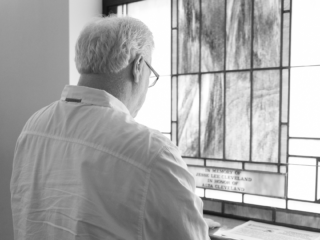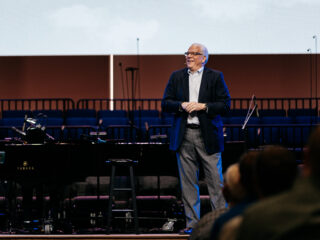When I first started reading the Bible a long time ago, I thought Paul’s teaching in Philippians to “Imitate me as I imitate Christ” was one of the most arrogant things I had ever read. Think about it. Paul seems to be saying, “If you don’t know how to act, act like I do because I’m doing it just like Jesus would”.
Then I became the father of two little boys.
And every conversation began with, “Here, son, let me show you how to do it.”
“Here is how you tie your shoes. Pull the strings tight and even. Cross one over the other….”
“Here’s how you tie a tie.”
“Here’s how you match your clothes.”
“Here’s how you shave your beard, wash your face, drive a car, look for a wife, apply for a job…”
You can talk about doing something as much as you want. You can watch teaching videos and analyze every step of the process, but until you actually perform the action yourself, you don’t know how to get it done.
Look at how Jesus taught the disciples. He would teach and then, He would send them out. They would come back and Jesus would teach them again. Jesus was the Master of blending theory and practice.
I’m not sure the church is.
When I first started preaching, I thought I was a good preacher because I could string together a long list of theological terms in a coherent sentence. I could get atonement, propitiation, sanctification, and the Trinity in the same paragraph and people thought that, because they couldn’t understand me, I was a good preacher.
I’ve learned from my mistakes. Now, I recognize good preachers rarely, if ever, use theological terms in their sermons. Why? Because no one in their congregation ever uses those terms.
It’s the same with the application of our teachings. When we tell our congregations they should have a time of prayer and Bible study every day, everyone will agree with us. None of them will do anything, but they’ll all know it’s something they should be doing. Why won’t they do anything?
Because they don’t know how.
No one has ever sat down with them to explain how the Bible is put together, how the books are arranged, how to read the different genres of Scripture, or how to apply the essential teachings of Scripture to our post-modern setting. So, they try for a little while on their own, but give up in frustration. Sadly, most of them conclude from their experience that the Bible is just too hard to understand and they never seriously try again.
No one teaches them how to pray. For several years, I was part of a young adult worship experience called Kairos. One night, in the middle of my teaching, I realized no one had ever explained to these young adults how to pray. No one had ever talked to them about the different kinds of prayer. They didn’t pray because no one ever taught them how.
The list gets longer. We assume our children will grow up and learn how to be good fathers and mothers, good husbands and wives, good friends and neighbors – but we never talk to them about how we do those things. And sadly, most of us don’t know enough to ask for help.
Most of us are doing as well as we know how. We don’t do better because we don’t know better.
Part of the genius of the church is we learn while in community. We learn how to live life as believers in the company of other believers. We watch people as they go through their day and from them, we learn how to love, handle our anger, worship, and pray. We can watch someone do what we think is impossible – things like, “Be angry, but sin not…”
Really? You can do that? Yes. Frustration and loss are part of life and anger is a natural and appropriate response. But how can you be angry, but not lose your cool? We watch our brothers and sisters deal with their own frustrations. Then, we imitate them.
We practice until our action becomes natural – until we can do what is asked of us at the moment without thinking about it. Because we learned from a more mature believer and in turn, we teach those who are watching us.
Most people want to do better. They just don’t know how. We want to do better, but most of us don’t know.
So, what do we do? First, ask for help. Go to a friend who’s a little further down the path and ask them to teach you.
Second, find someone who’s a little behind you on the journey and teach them what you know about how to live a life in Christ. Teach them what you’ve learned. Everybody has to start somewhere and if you don’t start, you will never get there at all.
Being a disciple of Christ means learning how Christ lived in our world and how we can live that way now. Learn from Jesus. Practice living according to His way.
And as soon as you learn it, teach it to the person closest to you. It’s the way all of us learn and if we don’t learn, we’ll never know how. And if we learn how, we’ll never do anything at all.









